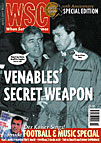 Neil McCarthy explains why French football fans may be tempted to stay at home on matchdays from the start of next season
Neil McCarthy explains why French football fans may be tempted to stay at home on matchdays from the start of next season
As from September, every single French First Division match will be shown live on television. A new interactive satellite channel will allow viewers to choose from one of nine matches played simultaneously – there is even the possibility of watching them one after the other, or all at once.
Interactive television is a familiar concept in the US, but is new to Europe. The new channel is a joint venture between the French League (LNF) and Canal Plus, a television company that has one scrambled terrestrial channel that is only accessible to subscribers, and several satellite channels. Canal Plus have had the rights to broadcast one live match per week for the past twelve years and they promise that this will continue to be available to their existing customers, who already pay a £20 monthly fee for their mix of sport and recent films.
The other nine matches will be shown on a new satellite channel for which viewers will have to buy a satellite dish and decoder for £75 and pay a £12 monthly fee. This installation will give them free access to satellite channels such as Eurosport and MTV, but they will have to pay extra for every football match they watch.
The image remains scrambled until a credit card is inserted into the set-top decoder. For the 1996-97 season each match viewed will debit £6 from the credit card. For someone to buy all of the equipment and watch all of one team’s games would cost in the region of £400.
One of the main concerns about showing all the matches live is that nobody will bother going to grounds any more. The solution to this rests in the fact that the new decoders contain the postal code of their owners. Each club can decide which postal codes cannot receive their home matches. “Our main target audience is the supporter who goes to all his team’s home matches. Our service will now allow him to follow all the away matches, too,” says Charles Bietry of Canal Plus.
Rather than sell the television rights to Canal Plus, the French League has decided to take a one-third share in the profits of the new channel, a decision that either accounts for their extreme confidence in its success or is proof that their chairman, Noel Le Graet, is really as mad as some people make out. It may be a bit of both – there is no great tradition of going to football matches in France but there is a growing trend for watching the game on television. Last season, the average weekly attendance for French First Division matches was around 130,000. The second’s weekly attendances vary, depending on whether Marseille are at home. If they are, the average is around 60,000; if they are not, it’s more like 25,000.
In total, only around 180,000 fans go to watch French professional football every week. (This compares to a television audience of 7.5 million who watched a friendly match between France and Portugal in January.)
In order for the new satellite channel to become what Noel Le Graet calls “interesting”, it will have to have 100,000 customers within two years. Obviously, Canal Plus and the League will have to seduce the armchair supporter as well as real fans in order to arrive at anywhere near their desired audience.
In the long term you have to wonder what the effect will be on clubs and supporters. If young football fans are attracted to big name clubs in preference to their local club today, what will be the effect when they can see all of the big clubs’ matches live every week? Surprisingly, criticism of this new channel has been practically non-existent in the press. In comparison, journalists at the Italian state broadcasting company, RAI, staged industrial action when news came that Cecci Gori Communications, owned by the MP and Fiorentina president, Vittorio Cecci Gori, had been awarded exclusive television rights to Serie A, including highlight packages, which will be broadcast on the company’s Telemontecarlo channel. The Italian deal, worth approximately £210 million over three years, is likely to include a ‘pay-to-view’ system, but the journalists’ main objection stemmed from the fact that Telemontecarlo is not broadcast nationwide. “The league has put financial interests before those of the public” said a RAI union spokesman.
The French football press regularly makes fun of Le Graet’s ideas for raking in more and more money for the French league, but seems to accept that interactive television and ‘pay-to-view’ television are inevitable consequences of television’s quest for audiences and football’s ever increasing thirst for money. The worry is that football relies too much on money from television and that someday the television public could turn away from the game in a way that today’s supporters never would.
From WSC 110 April 1996. What was happening this month